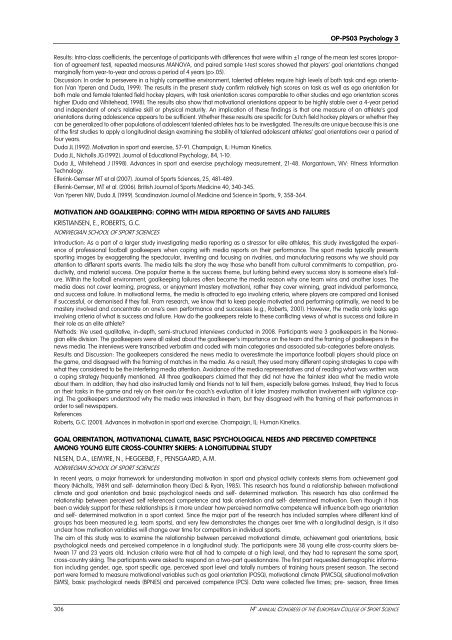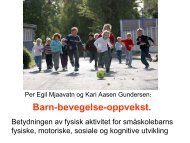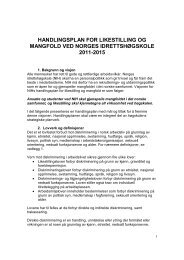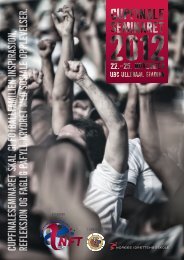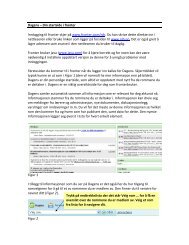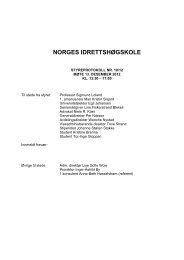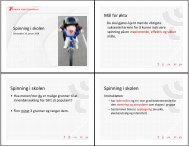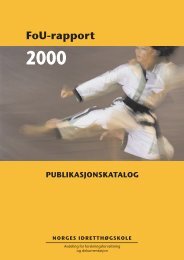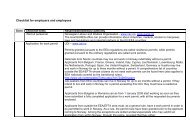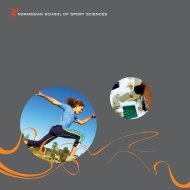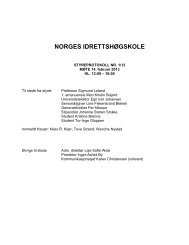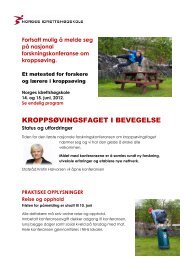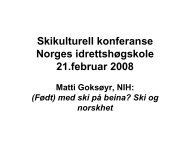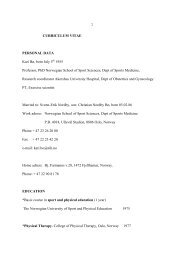european college of sport science
european college of sport science
european college of sport science
You also want an ePaper? Increase the reach of your titles
YUMPU automatically turns print PDFs into web optimized ePapers that Google loves.
OP-PS03 Psychology 3<br />
Results: Intra-class coefficients, the percentage <strong>of</strong> participants with differences that were within ±1 range <strong>of</strong> the mean test scores (proportion<br />
<strong>of</strong> agreement test), repeated measures MANOVA, and paired sample t-test scores showed that players’ goal orientations changed<br />
marginally from year-to-year and across a period <strong>of</strong> 4 years (p>.05).<br />
Discussion: In order to persevere in a highly competitive environment, talented athletes require high levels <strong>of</strong> both task and ego orientation<br />
(Van Yperen and Duda, 1999). The results in the present study confirm relatively high scores on task as well as ego orientation for<br />
both male and female talented field hockey players, with task orientation scores comparable to other studies and ego orientation scores<br />
higher (Duda and Whitehead, 1998). The results also show that motivational orientations appear to be highly stable over a 4-year period<br />
and independent <strong>of</strong> one’s relative skill or physical maturity. An implication <strong>of</strong> these findings is that one measure <strong>of</strong> an athlete’s goal<br />
orientations during adolescence appears to be sufficient. Whether these results are specific for Dutch field hockey players or whether they<br />
can be generalized to other populations <strong>of</strong> adolescent talented athletes has to be investigated. The results are unique because this is one<br />
<strong>of</strong> the first studies to apply a longitudinal design examining the stability <strong>of</strong> talented adolescent athletes’ goal orientations over a period <strong>of</strong><br />
four years.<br />
Duda JL (1992). Motivation in <strong>sport</strong> and exercise, 57-91. Champaign, IL: Human Kinetics.<br />
Duda JL, Nicholls JG (1992). Journal <strong>of</strong> Educational Psychology, 84, 1-10.<br />
Duda JL, Whitehead J (1998). Advances in <strong>sport</strong> and exercise psychology measurement, 21-48. Morgantown, WV: Fitness Information<br />
Technology.<br />
Elferink-Gemser MT et al (2007). Journal <strong>of</strong> Sports Sciences, 25, 481-489.<br />
Elferink-Gemser, MT et al. (2006). British Journal <strong>of</strong> Sports Medicine 40, 340-345.<br />
Van Yperen NW, Duda JL (1999). Scandinavian Journal <strong>of</strong> Medicine and Science in Sports, 9, 358-364.<br />
MOTIVATION AND GOALKEEPING: COPING WITH MEDIA REPORTING OF SAVES AND FAILURES<br />
KRISTIANSEN, E., ROBERTS, G.C.<br />
NORWEGIAN SCHOOL OF SPORT SCIENCES<br />
Introduction: As a part <strong>of</strong> a larger study investigating media reporting as a stressor for elite athletes, this study investigated the experience<br />
<strong>of</strong> pr<strong>of</strong>essional football goalkeepers when coping with media reports on their performance. The <strong>sport</strong> media typically presents<br />
<strong>sport</strong>ing images by exaggerating the spectacular, inventing and focusing on rivalries, and manufacturing reasons why we should pay<br />
attention to different <strong>sport</strong>s events. The media tells the story the way those who benefit from cultural commitments to competition, productivity,<br />
and material success. One popular theme is the success theme, but lurking behind every success story is someone else’s failure.<br />
Within the football environment, goalkeeping failures <strong>of</strong>ten become the media reason why one team wins and another loses. The<br />
media does not cover learning, progress, or enjoyment (mastery motivation), rather they cover winning, great individual performance,<br />
and success and failure. In motivational terms, the media is attracted to ego involving criteria, where players are compared and lionised<br />
if successful, or demonised if they fail. From research, we know that to keep people motivated and performing optimally, we need to be<br />
mastery involved and concentrate on one’s own performance and successes (e.g., Roberts, 2001). However, the media only looks ego<br />
involving criteria <strong>of</strong> what is success and failure. How do the goalkeepers relate to these conflicting views <strong>of</strong> what is success and failure in<br />
their role as an elite athlete?<br />
Methods: We used qualitative, in-depth, semi-structured interviews conducted in 2008. Participants were 3 goalkeepers in the Norwegian<br />
elite division. The goalkeepers were all asked about the goalkeeper’s importance on the team and the framing <strong>of</strong> goalkeepers in the<br />
news media. The interviews were transcribed verbatim and coded with main categories and associated sub-categories before analysis.<br />
Results and Discussion: The goalkeepers considered the news media to overestimate the importance football players should place on<br />
the game, and disagreed with the framing <strong>of</strong> matches in the media. As a result, they used many different coping strategies to cope with<br />
what they considered to be the interfering media attention. Avoidance <strong>of</strong> the media representatives and <strong>of</strong> reading what was written was<br />
a coping strategy frequently mentioned. All three goalkeepers claimed that they did not have the faintest idea what the media wrote<br />
about them. In addition, they had also instructed family and friends not to tell them, especially before games. Instead, they tried to focus<br />
on their tasks in the game and rely on their own/or the coach’s evaluation <strong>of</strong> it later (mastery motivation involvement with vigilance coping).<br />
The goalkeepers understood why the media was interested in them, but they disagreed with the framing <strong>of</strong> their performances in<br />
order to sell newspapers.<br />
References<br />
Roberts, G.C. (2001). Advances in motivation in <strong>sport</strong> and exercise. Champaign, IL: Human Kinetics.<br />
GOAL ORIENTATION, MOTIVATIONAL CLIMATE, BASIC PSYCHOLOGICAL NEEDS AND PERCEIVED COMPETENCE<br />
AMONG YOUNG ELITE CROSS-COUNTRY SKIERS: A LONGITUDINAL STUDY<br />
NILSEN, D.A., LEMYRE, N., HEGGEBØ, F., PENSGAARD, A.M.<br />
NORWEGIAN SCHOOL OF SPORT SCIENCES<br />
In recent years, a major framework for understanding motivation in <strong>sport</strong> and physical activity contexts stems from achievement goal<br />
theory (Nicholls, 1989) and self- determination theory (Deci & Ryan, 1985). This research has found a relationship between motivational<br />
climate and goal orientation and basic psychological needs and self- determined motivation. This research has also confirmed the<br />
relationship between perceived self referenced competence and task orientation and self- determined motivation. Even though it has<br />
been a widely support for these relationships is it more unclear how perceived normative competence will influence both ego orientation<br />
and self- determined motivation in a <strong>sport</strong> context. Since the major part <strong>of</strong> the research has included samples where different kind <strong>of</strong><br />
groups has been measured (e.g. team <strong>sport</strong>s), and very few demonstrates the changes over time with a longitudinal design, is it also<br />
unclear how motivation variables will change over time for competitors in individual <strong>sport</strong>s.<br />
The aim <strong>of</strong> this study was to examine the relationship between perceived motivational climate, achievement goal orientations, basic<br />
psychological needs and perceived competence in a longitudinal study. The participants were 38 young elite cross-country skiers between<br />
17 and 23 years old. Inclusion criteria were that all had to compete at a high level, and they had to represent the same <strong>sport</strong>,<br />
cross-country skiing. The participants were asked to respond on a two-part questionnaire. The first part requested demographic information<br />
including gender, age, <strong>sport</strong> specific age, perceived <strong>sport</strong> level and totally numbers <strong>of</strong> training hours present season. The second<br />
part were formed to measure motivational variables such as goal orientation (POSQ), motivational climate (PMCSQ), situational motivation<br />
(SIMS), basic psychological needs (BPNES) and perceived competence (PCS). Data were collected five times; pre- season, three times<br />
306 14 TH<br />
ANNUAL CONGRESS OF THE EUROPEAN COLLEGE OF SPORT SCIENCE


